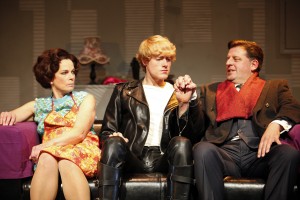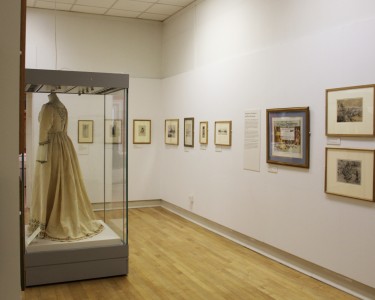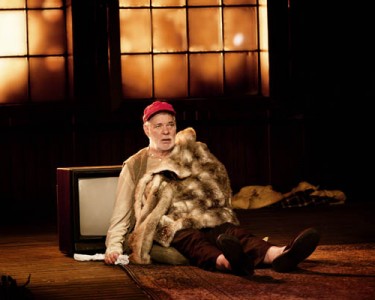
Some measure history in terms of a ‘grandad’ – a period of 50 years. It is just one year off a grandad since Leicester playwright Joe Orton wrote Entertaining Mr Sloane. Looking at the 60s memorabilia of typewriters, Baby Bellings and birdcages fronting the sparse set brought back memories for those of a certain age, in my case my grandparents.
Joe Orton led a turbulent and tragically short life. However, he is immortalised in Orton Square which many in tonight’s audience crossed to see the first full-length performance at Curve of his work, written in 1963 as he was becoming known as a writer rather than inmate.
As the lights dimmed a short montage of photos of key events from the 60s and early 70s were projected on a screen accompanied by early Rolling Stones’ hits. This is becoming a familiar technique – important to set context although I would have preferred a shorter selection of clips. The actors in the play appeared briefly at the end of the sequence which was a nice touch. Also, perhaps this was a reflection of Orton and his lover Halliwell’s habit of ripping pages from library books to create their own montages at home?
Entertaining Mr Sloane is played out in the living room of Kemp (John Griffiths) and his daughter Kath (Julia Hills). Brother Ed (Andrew Dunn) visits occasionally although there are tensions between father and son. We meet the eponymous Mr Sloane (Alex Felton) as Kath takes him in as a lodger. It is a modest family home and Ed a relatively successful businessman, “I’m the proud owner of two bank accounts.” However the land around them is used as a local dumping ground.
Kath is all scurried busy-ness as she trots about the room tidying, spraying and generally keeping up appearances. She lusts after young Mr Sloane who does little to fend her off and when Ed appears, he also falls for Sloane’s chiselled looks. Hills gives Kath’s desperation a steel edge, Dunn is both brash and touching in his less obvious play for Sloane. Felton’s physical attributes are noticeable yet I was less convinced by this portrayal – he was certainly cocksure on stage but this alone wouldn’t have generated such interest from brother and sister.
The montage theme was revisited before Act Two – ‘some months later’ on the screen was not needed as the change of tone, time and character development was indicated immediately via Sloane’s body language,sprawled across the couch and obviously now in control of the household.
The play itself deals with some pretty uncomfortable material: abuse, Oedipal tendencies and characters brimming over with hypocrisy. Griffiths, his health gradually deteriorating as the myopic father interestingly is the only one to see Sloane as a violent, manipulative thug – at a cost.
This play is significant – for Curve, for Leicester and to show how society can change in a relatively short period of time. Orton was the master of farce and Entertaining Mr Sloane is certainly farcical plus added barbed one liners. He masks forbidden homosexuality (in 1963) through coded language and pokes sharp sticks at society’s double standards. As demonstrated by the montage of clips predominantly from events after the play was written, they allow us to see with hindsight how far society has progressed in ‘one grandad’. Not perfect still, but more open and understanding.






